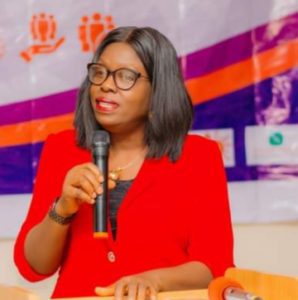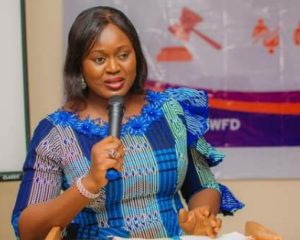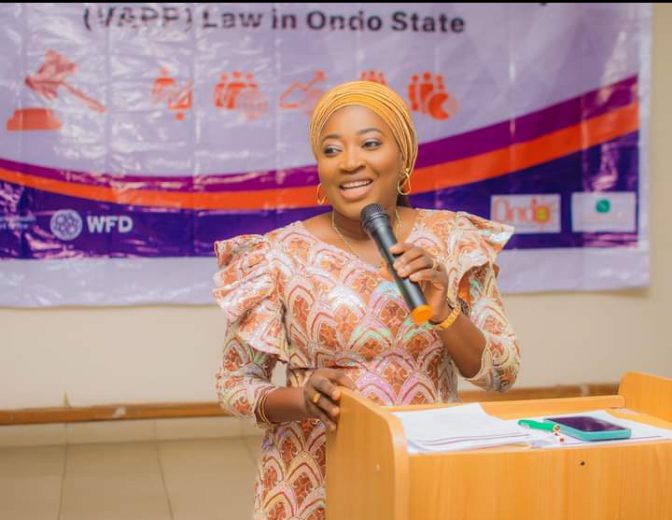Nigeria’s 2023 General Election was characterized by money bag and political violence, discouraging a lot of women from active participation in politics despite their voting strength. In this article Olufisoye Adenitan writes about the low representation of women in the Ondo state House of Assembly and their victimisation in politics.
Elegantly dressed in a golden-coloured lace gown with her simple headgear and light makeup, the Ondo State Anthem was played as she walked up to the podium to address the audience with her mature voice and aura of confidence which enveloped the atmosphere.
Honourable Olawumi Fayemi represents Ilaje Constituency II in the Ondo State House of Assembly, with other two women from Idanre and Owo constituencies, making a total of three female lawmakers in the Ondo State House of Assembly.
She was a special guest at a recent summit on gender-based violence where she grasped the microphone and expressed concern on the need for more women to be given opportunity in the political space.
She recounted her experience and major drive into politics which was borne out of her desire to see women’s liberation in every facet of life.
Hon Fayemi was voted on the platform of the ruling All Progressive Congress including the other women presently in the 10th Assembly of Ondo State.
Affirming how finance has limited the participation of women in politics, Hon. Fayemi said “moneybag politics limited the number of women in politics, it is a major impediment, but we are hoping that subsequent elections would be good for women to emerge as Representative as we women there would push for gender-friendly bills that would help to bring more women on board.”
She also noted that “out of the 26 members of the Assembly only 3 are women, the ratio is quite wide, but we will continue to do our best. As a legal practitioner, I know my rights under the law and any form of intimidation will not be tolerated either by male or female colleagues in the house.”
During the 9th assembly (2019-2023) in Ondo state, Favour Semilore Tomomewo of the Ilaje Constituency II, was the only female lawmaker in the state’s parliament. At some point, she was suspended for alleged anti-party activities.
Nigerian women over the years have shown interest in political participation, but various barriers have limited them in the space.
Some of the limitations are intimidation, violence, and moneybag politics as experienced in the February 25th 2023 election which limited the participation of more women in political positions. Although many political parties in Nigeria during the election created an avenue for women to be emerge as party flagbearers.
In an interview, a female member representing Emure constituency in the Ekiti state House of Assembly, Alhaja Mariam Ogunlade said both past and present government in Ekiti state was intentional in encouraging women into key sectors without intimidation or harassment.
“I was a former commissioner for women’s affairs in Ekiti state under John Kayode Fayemi’s administration before I was given the ticket to run for the state Assembly alongside other five women who we emerged members.
“After we were inaugurated, a policy framework was drafted to give women 40 percent slots for key positions for adequate representation of females in every sector in the state,” she added.
Dissecting how existing laws seem to promote money politics in Nigeria, a Political Scientist, Gender rights advocate from the Department of Gender Studies, Adekunle Ajasin University, Akungba Akoko, Professor Bukola Osunyikanmi said the Electoral Act 2002 as amended promoted money bag politics and corruption, it created an impression that politics is meant for rich alone thereby incapacitating the minority groups like women, youths, and disability community.

According to her, for a state Assembly election, a candidate is expected to spend not more than 30 million naira as campaign expenditure.
Professor Osunyikanmi recounted how party delegates were bribed in the build-up to the 2023 election and it becomes problematic for women to fund their elections.
“Issues of gender inequality in parliament should urgently be addressed, decision-making should involve everyone, especially women,” she added.
One of the frontline female politicians in Ondo State, the Special Adviser to the Governor on Gender matters, Mrs Olamide Falana said there are different interventions by Civil Society Groups to ensure that women are not exempted in politics.
She said “we need more quality women with the mental capacity to withstand the heat of the game of politics to emerge as leaders for other women to look up to in the political space.”

Mr Olorunmola Adebowale, Country Director Westminster Foundation for Democracy, a partner of the Ondo state government in the implementation of all forms of gender-based violence highlighted that women represent 49 percent of the population of Nigeria of over 200 million while just 3.5 percent are representatives at the parliamentary level, stressing that, there is need to take a critical look at how laws are used to protect women, youths and persons with disability.
Olorunmola noted that the Violence against Person Prohibition law should be used to enhance inclusion of women and persons with disabilities in the political process.
Similarly, the Executive Secretary, of Ondo State Agency against Gender-based Violence, Barrister Bolanle Afolabi said the VAPP law domesticated in the state has a wider coverage that protects and punishes offenders of political violence or intimidation.
“Violations of rights under the law take care of the rights of women if victimised, Mrs. Afolabi said.”
Addressing the menace
Speaking on how to tackle the victimization of women in politics, Mrs. Falana suggested the Prosecution of political offenders, reducing the amount of money required for politics, and that women should not be given tickets with pittance but with the capacity to adequately represent well.
“We don’t have enough women in the house, no parity in the gender there, however, the few there should represent the women’s voices without any intimidation by either their fellow women or men” Falana submitted.
“Capable women with the required experience, knowledge and resources should support young women in politics, like the men do,” Falana added.
On his part, Mr Adebowale Olorunmola recommended that anyone involved in violation of rights of any gender during the election or in office should be prosecuted to serve as a deterrent to others
“Women should be aware that laws are in place to protect them when they are hindered by either their female or male counterpart this will encourage more participation in politics.
We should see how to use the VAPP law to enhance inclusion in the political process, Olorunmola maintained”
In her submission, the Executive Secretary of, the Ondo state agency against gender-based violence, Bar Bolanle Afolabi suggested that women need to be encouraged , there is the need for them to propose draft bills that guides against gender-based violence and promote the rights of women.
Also, Professor Bukola Osunyikanmi advocated adequate mentorship of women politicians by women leaders in the political space.
“For women to leverage on their capacity in the political space, women to women support is required to scale through in politics, women should serve as Godfathers to fellow women with adequate backing ” Prof Osunyikanm added.
Honourable Fayemi, a member of the 10th Ondo State House of Assembly,maintained that it is her resolve no matter the heat the few women representatives at the assembly may face,they would represent the interest of women in the state well.
It is also hoped that women-focused groups, organisations and politicians would be deliberate and Intentional in supporting women not only during elections but in positions of power irrespective of party affiliation.
This story is part of the African Women in Media (AWiM)/Luminate Young Women in Politics Media Project.

